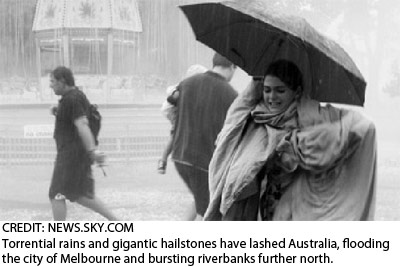Life Meets Faith: Are we doomed?

I don't want to try to be prophet of the future. But with New Year's Day behind us it might be worth trying to wave a few wisps of fog away and look further into the current decade.
What appears to be the biggest thing on our minds these days is the hoped-for economic recovery. Political leaders are eager to report any signals that we are ploughing out of the recession. Someday, we hope, we will be able to look back on 2011 and say that that was the year factories began to hum again and unemployment was rolled back to seven, six and then five per cent.
Maybe it will happen. But even if it does, and we are able to put some of our financial and employment stresses behind us, where does that leave us?
It still leaves us with issues that numb the mind. They look so big that many can be forgiven for throwing up their hands. We try to find a niche in life that works for us and hope that no serious catastrophes will fall on us before we die of natural causes.
However, as is often pointed out, facing reality is the first step in dealing with it. What realities are we facing? Well, for one thing, the world's population is growing at an alarming rate. If you are not aware of this you may be spending too much time on Facebook.
Second, connected with this, the ability of the world to feed itself is dropping alarmingly. This week a Dragon's Den spin off trumpeted the fact that fertilizer companies are good investments. Why? Food prices are about to rise (quickly maybe) because there will be less of it. So industrial agriculture - that depends on fertilizers - is going to try to grow, thus increasing the demand for said nutrient source.
Connected with food production is climate change. One of the factors in food production is the loss of arable land because of climate change. The turbulent weather predicted by those watching global warming seems to be here big time. Warm weather allows the pine beetle to spread, turning the forests in the Rockies red. There is recordbreaking rain and flooding in Europe, Manitoba, New Brunswick, Australia, and more frequent storms on Canada's east coast. Climate change is happening so quickly that it is not likely that new land can be adapted fast enough to make up the losses of current agricultural land.
Connected with climate change is the industrial economy we are trying to rebuild. An economy that runs on oil, the internal combustion engine, jet propulsion and firebelching factories, as our does, will increase the rate of climate change. Ironically, it's that very economy we are trying to resuscitate. And countries that don't yet have strong modern environment-poisoning industries are doing all they can to build them.
And connected to this is our education system. Our community colleges and universities are not churning out students who know how to grow food at their homes or who could return to the land where, until recently, most of us would have lived. We are producing millions of graduates each year who are trained to pave the planet over, build cars and high-speed trains, and manage financial companies that depend on the success of large-scale industry. (They, and we, want Ford and GM to succeed because we have invested in them.) While the planet desperately needs us to stop driving cars (we existed for millions of years without them) we keep building them, which in turn moves the Ontario economy "forward."
Are we doomed?
Editorial opinions or comments expressed in this online edition of Interrobang newspaper reflect the views of the writer and are not those of the Interrobang or the Fanshawe Student Union. The Interrobang is published weekly by the Fanshawe Student Union at 1001 Fanshawe College Blvd., P.O. Box 7005, London, Ontario, N5Y 5R6 and distributed through the Fanshawe College community. Letters to the editor are welcome. All letters are subject to editing and should be emailed. All letters must be accompanied by contact information. Letters can also be submitted online by clicking here.













